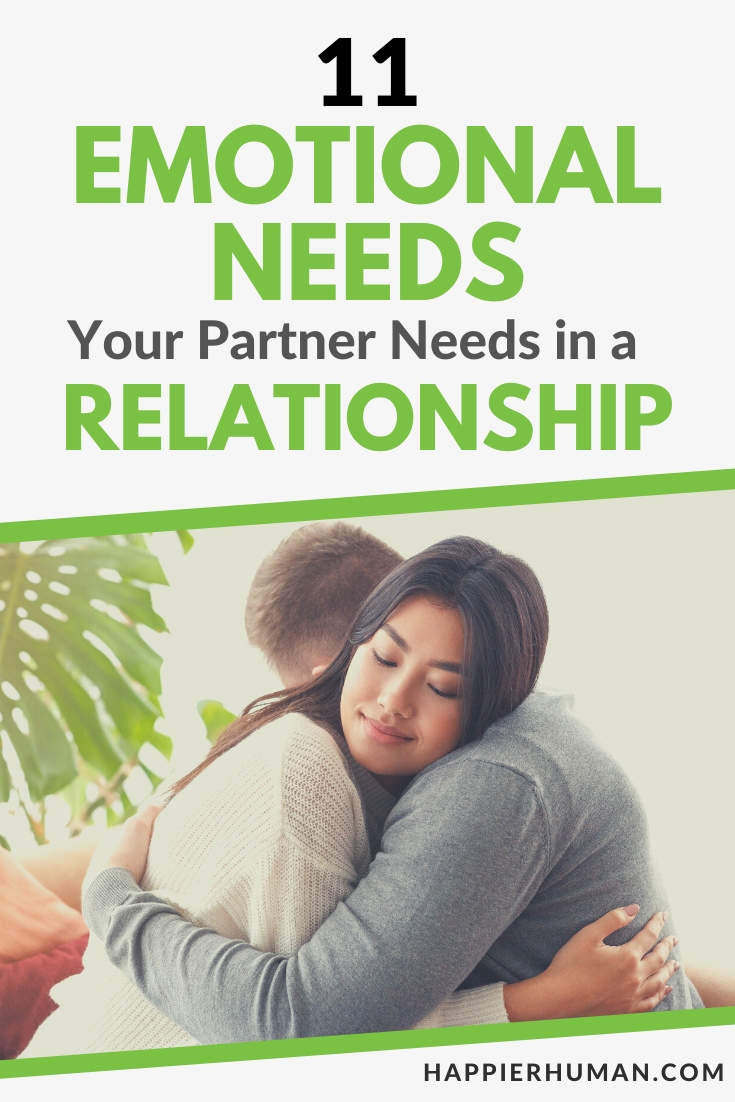A relationship is a place of safety where you and your partner meet each other’s needs. When you are in a caring relationship, you learn to address your partner’s needs and ensure they feel satisfied, seen, and understood in the relationship.
One of the most important aspects of a partnered relationship is the emotional needs in a relationship.
While you may be fully self-aware and know what you need in your relationship, it’s a whole different challenge to know what your partner needs… especially if they’re not as self-aware or don’t know what it is they need (from you) to satisfy their own emotional needs.
Do you know what your partner needs in the relationship? Are you helping them to meet their emotional needs? Discover what emotional needs your partner may have and how you can help to meet these to form a stronger bond.
What Are Emotional Needs?
All living beings have needs, and while most of those needs are about basic survival, deeper needs that satisfy your need for acceptance, validation, and relationship security are just as important. When your needs for food, water, and shelter are met, you begin to focus on emotional needs that help you self-actualize.
Maslow’s hierarchy of needs provide a clear structure for the basic needs that should be met before you can address their emotional needs, but the emotional needs your partner has are as important as any need for food, clothing, a home, or sex.
In a relationship, you create a safe space where you and your partner contribute to meeting each other’s emotional needs or higher level needs.
When an emotional need is satisfied, it creates a sense of well-being and contentment. However, if your emotional needs are not met, you’ll feel unhappy and dissatisfied with life in general.
How Emotional Needs Differ Based on the Nature of a Relationship
Nobody’s emotional needs are the same, and your emotional needs are defined by your experience, life-stage, and what you need from the person you are in a relationship with. Not all relationships are romantic, and we have many kinds of relationships from the moment we are born until we die.
Your emotional needs differ with your parents, your peers, your employers, your romantic partners, and with friends. So, a child will likely have different emotional needs than you (as an adult) do, since they are at a different developmental stage in life.
Some examples include:
In a meaningful friendship, your emotional needs may include receiving empathy and connection.
Why Are Emotional Needs Important?
It’s a lot to ask your partner to meet every single one of your emotional needs, and ultimately, the onus is on you to meet any needs you have to feel fulfilled and content in yourself and with your life. That being said, it is essential for both partners in a relationship to bring their share by meeting each other’s emotional needs.
When your loved one meets most of your emotional needs (and actively works on this), chances increase that your relationship will be healthy, happy, and successful (and will last).
It is often in toxic or unhealthy relationships that you’ll find the emotional needs of the couple aren’t met, and in the best case scenario here, only one partner is actively working on taking care of the other’s needs while their own needs are (often) forgotten and unfulfilled. The person whose needs are not met feels hurt, frustrated, dissatisfied, and like they aren’t worthy or enough.
When partners intentionally refuse to meet each other’s emotional needs, it could be an indication that one partner is a narcissist or suffers from a personality disorder.
Such a partner is not able to invest and support their partner’s emotional journey, and this creates unfair pressure on the partner whose needs go unmet. They no longer have that soft place to turn and they walk the desert of their emotions alone.
11 Emotional Needs in a Relationship
Each person will have their own set of emotional needs that they would appreciate their partner helping them meet. Our childhoods, circumstances, and experiences contribute to creating needs that have been unmet and leave us with an emptiness that our partner can help us fill.
We tend to naturally seek a partner who fills the gaps in our feelings. If your need is for affection, you will be drawn to someone who is affectionate.
Let’s consider some different emotional needs in a relationship and how to meet them.
1. Autonomy
While sharing activities is normal for a relationship, and though this builds bonds, it’s vital that a relationship is still composed of two unique individuals. If you and your partner become so enmeshed that you are no longer individuals, you will begin to resent your partner (and they you) since you can’t meet their need for individuality.

Being too clingy and insisting on being with your partner in all their leisure (and sometimes work) time is not going to meet their emotional needs, and they will feel stressed because they won’t have a sense of autonomy.
How to Help Your Partner Feel Autonomous: If your partner requires more autonomy, help them by encouraging them to undertake personal (or solo) hobbies and activities that will bolster their sense of self. Solo hiking, playing chess, and kayaking can be healthy ways to help push them toward being independent.
Part of this is also being able to say no when your partner asks you to join them so you can help them carve out time for themselves alone.
2. Trust
If your partner tends to lack trust in you, people, and themselves, it could indicate they have previously suffered a serious breach of trust. Perhaps you have even failed their trust in the past.
Helping your partner learn to trust again is important as it reprograms their subconscious to see their world in more positive tones.
Trust comes with security, and making your partner feel safe by being responsible, keeping to your word, and letting them know when things are out of your control and go wrong (such as when you get a flat tire and will be home late) all add up to helping your partner feel safe with you.
How to Help Your Partner Build Trust: With trust, it’s important to discuss what trust is and means to you with your partner. We all have different definitions and deal breakers that we hold to when it comes to trusting our partners.
You may be surprised to learn your partner has seemingly insignificant things (to you, that is, while it is significant to them) that make them doubt people. Knowing what triggers them can help you help them feel safe.
Consider couples therapy or using trust-building exercises that help your relationship develop and become more trustworthy.
3. Empathy
How well do you understand your partner? With understanding comes the ability to see someone else’s side of things. Help your partner meet their need for empathy by seeing things from their side or point of view.
Understanding leads to compassion, which means forgiveness is not far off. Your partner will cherish your empathy when they do something wrong like forgetting your birthday, but instead of getting angry, you realize they were working late and were tired. Forgetfulness wasn’t intentional in this instance, but rather because of life happening.
How to Help Your Partner Develop Empathy: Practice listening with your partner, help each other paraphrase discussions to build on your ability to really hear and understand each other. With empathy comes safety and acceptance, and empathy builds trust.
4. Validation
It always helps to know someone sees you and understands you and also values your ambitions and goals in life. This is known as validation, and when you and your partner validate each other’s experiences, it’s about saying to each other, “I hear you, and I see you.”
Validation doesn’t mean you become your partner’s lapdog. Instead, it’s about you and your partner knowing that while both of you don’t agree on everything, you still assign equal value to each other’s experiences.
How to Help Your Partner Feel Validated: Take the time to listen to them, see them, and hear them. Your responses and making time for each other all add up to validate what we go through.
5. Acceptance
While you may like and love your partner, the real question is whether you accept them. Feeling accepted is a deep emotional need. Feeling unaccepted can lead to not feeling included.

With acceptance, you and your partner can help each other feel like you belong and that you are welcome there.
How to Help Your Partner Practice Acceptance: Using affirming words when thanking them, expressing gratitude, and inviting them into your space all help them feel like they are accepted.
6. Affection
Feeling like someone loves you comes from experiencing their affection, which in turn, helps you show affection too.
When you grew up in an unaffectionate home as a child, you may struggle with showing affection, and when people are affectionate with you, it may be overwhelming. The same applies to your partner.
How to Help Your Partner Show Affection: Show your partner that affection is safe and it’s okay for them to show you affection. Tell them you love them, but also pay attention to their love language. If they are more physical, then hug them more, touch them, and consider physical intimacy as a way of expressing affection.
Remember that a lack of affection from either or both partners is often the leading cause of a relationship failing. So work at this emotional need for the sake of your relationship health.
7. Being a Priority
While you and your partner should have a life outside the relationship, you should also ensure your partner feels like they are a priority to you. This means you and they should include each other in decisions and considerations.
Knowing that you are a priority to someone in your life is a powerful thing, and your partner will feel a tremendous boost to their self-esteem if they are assured that they matter to you and they are important enough that you will put them first.
How to Help Your Partner Feel like a Priority: Remind your partner they are a priority to you. Whether you physically tell them, or you choose them over other options in your life, place them first and make sure they know it.
For example, you can decide to rather stay home with your partner on a Sunday afternoon than head out with your birding group, because you know your partner doesn’t feel well. They will realize you love and care for them since you placed their needs first.
8. Connection
We enter relationships to feel connected. As humans, we are social animals, and we don’t always do well with too much isolation. In a relationship, it’s important to have your own interests and shared interests.
How to Help Your Partner Make a Connection: Connection is built with shared activities and interests. If your connection has become frail, you can both work on it by swapping stories, sharing fond memories, engaging in unique and novel activities together, and simply learning more about each other with real interest and care.
9. Valued and Appreciated
When last did you tell your partner they mean so much to you? Do you recognize their contributions or do you simply take them for granted?
Value your partner by appreciating them for their physical, mental, financial, and emotional contributions in your partnership.
How to Help Your Partner Feel Valued: Practice gratitude and appreciation by considering them, seeing them, and meeting their unique emotional needs.
10. Honesty
Honesty is a basic need we all have. When we feel safe in a relationship, we can be totally open and honest. Being honest also comes with an unburdening of self. It’s liberating to open up about your fears, hopes, and dreams.

Being totally honest in a relationship is about no longer having any pretenses or “best feet forward” ideologies. You are who you are, and you let your partner be who they are, without wanting to change them.
How to Be More Honest with Your Partner: Become more honest with your partner and let them see your vulnerable side without your usual barriers in place, which will encourage them to reciprocate and also drop their walls to show you their honesty and vulnerability.
11. Communication
One of the biggest needs in a relationship is to be able to talk openly, be heard, and feel gotten. Communication is needed as this is how you overcome challenges, bond, and know each other.
Without communication, you and your partner will remain strangers to each other and never meet each other’s emotional needs.
How to Communicate More Effectively with Your Partner: Not all of us are naturally good at communicating, and you or your partner may really suck at opening up and asking for what you want. Overcome this by making communication a regular thing with different ways of communicating like asking each other questions to share and get comfortable.
Try this or that questions or intimate, soul-searching questions for couples to help you and your partner really talk and share.
Final Thoughts on Emotional Needs in a Relationship
While we tend to focus on our own emotional needs in our relationships, it’s also important to care about your partner enough to meet their emotional needs.
Emotional needs are requirements that help us function better in relationships, and with these needs met, your partner will be more of them self with you, give more of them self to you, and care more about you too.
For more on becoming a caring person, read our guide with 13 ways to become a more caring person.
And if you're looking for more articles about relationships, be sure to check out these blog posts:
- 16 Signs You Have a Right Person, Wrong Time Relationship
- 15 Warnings Signs You Have a Toxic Girlfriend
- How to Get Over Trust Issues in a Relationship: A Simple Guide


